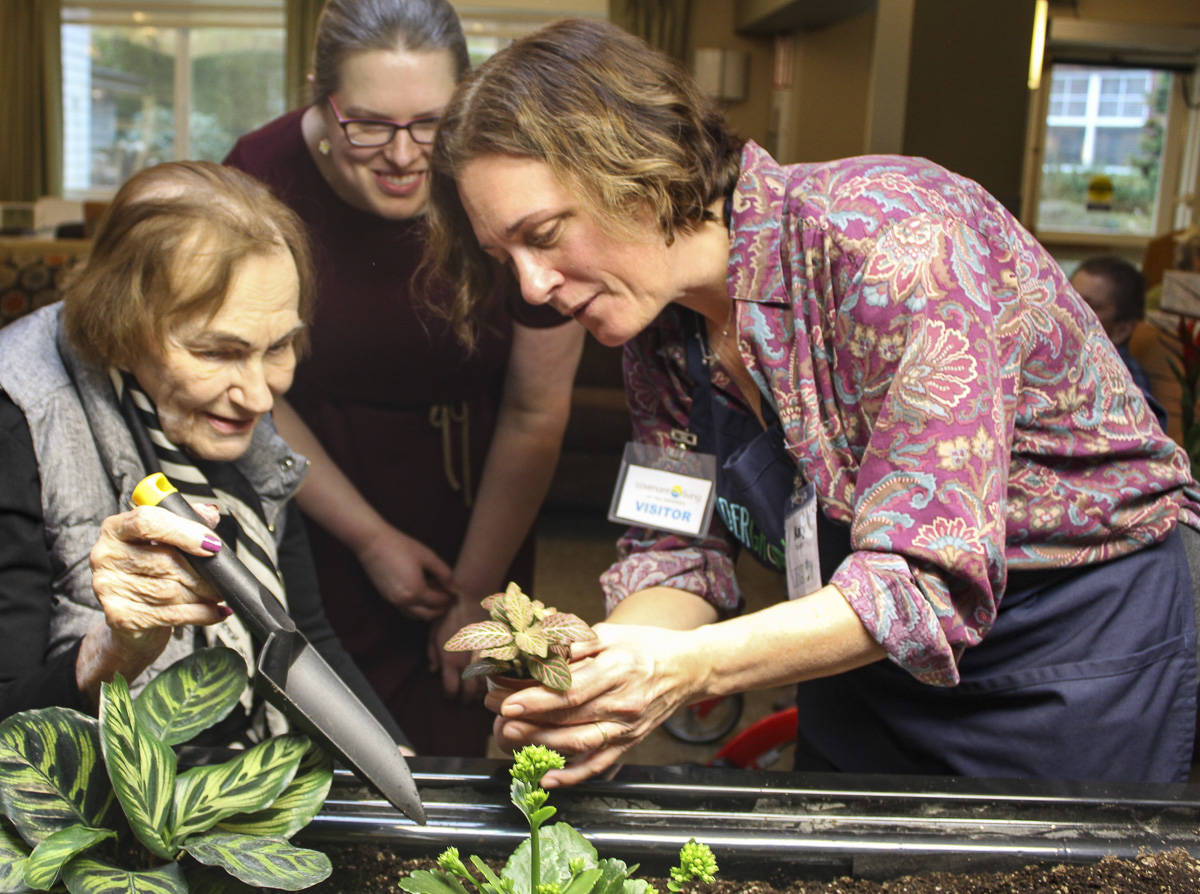Horticulture therapy has come to Mercer Island with the retirement community Covenant Living at the Shores introducing residents to its new Eldergrow mobile sensory garden and program.
On Jan. 17 Covenant Living at the Shores (CLS) and Seattle-based company Eldergrow together had a kickoff event to celebrate CLS’s new indoor garden and therapeutic horticulture program. Residents began filling the garden with herbs and colorful flowers.
Eldergrow program administrator Katy Dittmer, who teaches in two similar communities, has been running kickoff events like these all over the state. With funding from a state grant, Eldergrow has launched 45 gardens in 31 communities over the last five months in Washington. Each community, depending on size, gets a different number of gardens.
Eldergrow’s gardening programs connect seniors in residential and personal care communities to nature. This is the first on Mercer Island.
Dittmer shared some of her experiences from working with people in this type of therapy. She said she had found many people who now need this type of care to have come from an agriculture background, but it’s likely been years since they have had the ability to engage with soil, to garden, since before they had to be in this kind of care.
When residents are first introduced to the activities, she said they are typically distant at first, needing encouragement, until someone breaks the ice. She said she can always tell the gardener in the room and she often says to people, “I can tell you were a gardener.”
Then the flood gates open and their excitement is contagious, she said.
“People get enthusiastic — it doesn’t matter where they are at,” Dittmer said. “Whether they have some cognitive impairment or they’re completely with it, it’s very impactful. We have a lot of successful stories.”
She explained that while there are many therapeutic activities that support memory care and assisted living, there are many benefits of horticulture therapy.
“Horticultural therapy engages all five senses,” she said. “In doing so that’s what makes people so completely engaged.”
The kickoff at CLS went well, Dittmer said, and the staff were engaged, too.
“Staff engagement is crucial to the success of the program. If staff’s excited about it, residents are excited about it,” she said.
Dittmer will return to eastern Washington now, but the program will continue at each location with a local educator coming in to lead an hour long class twice a month. That will include culinary and garden art practices.
Additionally, the community and staff are provided with additional curriculum to engage with residents on the off weeks. Daily interactions also are encouraged and some residents choose to be a little more hardcore with it, she said, with daily pruning and cultivating.
“There’s a lot that residents can do when the educator is not there,” Dittmer said.
All the plants used for the program are nontoxic. There’s a list of approved plants educators can choose from that includes perennials, annuals, house plants, herbs and edible plants. The commonality is they all do well in these types of garden beds, Dittmer said.
The garden beds and all related activities and take place 100 percent indoors. That way, residents can enjoy them inside where it’s warm all year long.
“We bring nature inside,” she said.
The most rewarding part, Dittmer said, is when she sees participants’ “infectious excitement.”
In a statement, Eldergrow founder and CEO Orla Concannon said, “Eldergrow’s indoor gardens not only bring nature inside, but also provide proven mental and physical benefits, while giving residents renewed purpose.
“We are excited to grow smiles and laughter with the residents of Covenant Living at the Shores.”
Eldergrow is four years old now and they have similar gardens in 21 states. More information about Eldergrow can be found online at eldergrow.org.
“We are delighted to incorporate Eldergrow’s innovative programming here at Covenant Living at the Shores,” said Rene Dumas, CLS executive director. “Our team is always looking for new and innovative ways to engage our residents. The new garden will give our residents the opportunity to create something with their own hands, giving them a sense of pride as they use the plants they grow for fun activities and culinary programs.”
That same CLS press release said study data in a 2014 University of Washington and United States Department of Agriculture Forest Service Report shows horticultural therapy to reduce depression, improve balance, endurance and coordination, and lower the risk of dementia by 36 percent.


